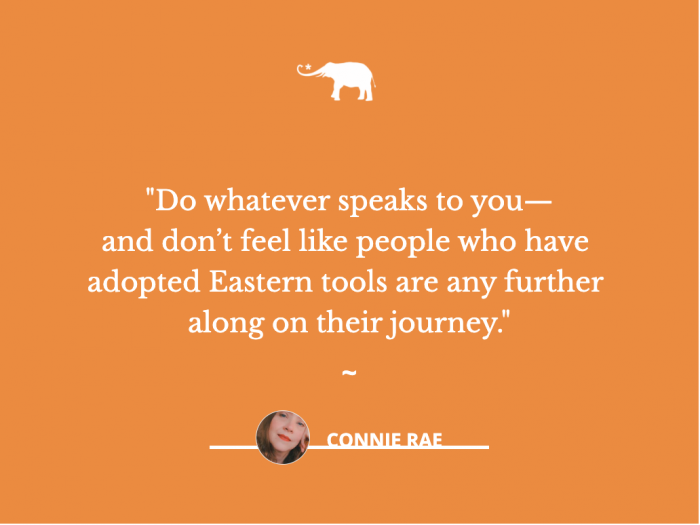~
Namaste!
I say namaste as it is part of a language that feels as natural to me as the breeze and the beach.
What do I mean when I say Namaste?
Simply hello! Nothing more, nothing less.
Hindi-speaking people in India greet each other in this way millions of times a day, and no one is thinking about a deeper meaning.
Why do white people say Namaste to me? Why not just say hello? They say it means “the divine in me bows to the divine in you.”
No, it doesn’t. It just means hello.
This is what my brain said every time before I took my irritation by the horns and did some serious talking to myself.
The human quest is to feel more in touch with ourselves—to make sense and meaning of this one life that we have. We all go through stages where we feel that life is a little meaningless. Whether this is after a bereavement, during a mid-life crisis, because of depression, after feeling stuck in the corporate world, or just through a process of growing into ourselves, most of us have thought at some stage, “Is this it?!”
Then, we begin our quest for ways to delve deeper with the tools of the self-discovery trade—and more often than not, we turn to the East.
India, especially, has so much to offer. Yoga, meditation, and even a natural medicine system in Ayurveda. There are great religions, so different from the “one God” religions of the West. Hinduism and its offshoots—Buddhism, Sikhism, and Jainism. And, there are gurus galore. Holy men and women will share the teachings with you for a cost or donation or sometimes just from the goodness of their hearts. Also, there the teachings and the books that they come from the Gita and the Ramayana, there are the Upanishads and the Vedas, the Agamas, the Puranas, the Strotras, and the list goes on and on.
What’s not to love? Such a deep well of wisdom to draw from, so much meaning, and so life’s problems will be solved.
I don’t agree!
I moved to India in 1980 when I was four years old to live in an Ashram.
My mum suffers from bipolar disorder, my dad was in hospital having suffered a breakdown, and social services were making too many calls. My Cambridge University-educated uncle had gone looking for his tools of self-discovery and had ended up in India meditating at an Ashram.
It wasn’t an Ashram in the typical sense of the word. Yes, there was a guru, and Hinduism was the main ethos, but families were welcome, and the Hindus do not convert.
In fact, the guru, or Ma as we called her, encouraged my uncle to first find meaning in his own religion, Christianity, before rejecting it for Hinduism—which is what he wanted to do. She studied the Bible with him, which I still think is pretty amazing to this day. We were accepted with warmth and open arms.
I grew up in a culture where Hinduism, yoga, meditation, and many other tools were a way of life.
Some of the people who touched my life were beautiful, amazing, wise souls who I will never forget. But others were manipulating, controlling, power-hungry, and just all-around unpleasant people.
Sound familiar? Yes, pretty much the same as in the West. There are good people, bad people, and many in between.
So, what does this mean? To me, it means one thing.
The change lies within us.
Yes, the East offers some amazing tools, but the West has tools too.
And, we have the tools we need within us.
Recently while reading “Writing Down the Bones” by Natalie Goldberg, I was blown away. In discussing her Zen master and his practise of meditation, she explains how he used writing as a point of reference to explain Buddhist concepts to her. And then one day he said to her,
“Why do you come to sit meditation? Why don’t you make writing your practise? If you go deep enough in writing, it will take you everyplace.”
Wow—this is what I mean by different tools. Writing can give us what meditation does.
If we are not saying namaste, doing yoga, or practicing meditation, our lives can still be full of meaning.
Elephant Journal is a tool and an amazing one at that. It offers hope and meaning.
Other tools can be walks in nature, breathing slowly, reading, listening to music, connecting with friends, or spending time with family. Cooking, exercise, art, relaxation, running, dancing, yoga, and religion are as well.
Having said all that, an exception must be made for meditation. It is powerful and life-altering practise, proven both within culture and religion and by science. But we can meditate by walking in nature and listening to the birds. We don’t have to look at a wall or sit in a pose or watch your breathing or bow—although all these are valuable meditation tools.
Do your thing.
Do whatever speaks to you—and don’t feel like people who have adopted Eastern tools are any further along on their journey.
If you have stuck with ones from your own everyday life, know both are just as powerful as each other. In fact, sometimes it is easier to stick with something if it is more familiar and ingrained in our surroundings.
So to the yoga teachers, “Namaste!”
And to the walkers and writers, “Hello!”
I wish you all achievement in your journey—whatever that may be.
~









Read 12 comments and reply